<< Previous | Displaying results 2341-2350 of 6705 for "" | Next >>
-
Bella Jakubowicz Tovey describes the confiscation of her family's property
Oral HistoryBella was the oldest of four children born to a Jewish family in Sosnowiec. Her father owned a knitting factory. After the Germans invaded Poland in 1939, they took over the factory. The family's furniture was given to a German woman. Bella was forced to work in a factory in the Sosnowiec ghetto in 1941. At the end of 1942 the family was deported to the Bedzin ghetto. Bella was deported to the Graeben subcamp of Gross-Rosen in 1943 and to Bergen-Belsen in 1944. She was liberated in April 1945, and…
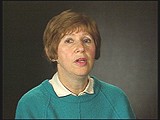
-
Lucine Horn describes the German occupation of Lublin
Oral HistoryLucine was born to a Jewish family in Lublin. Her father was a court interpreter and her mother was a dentist. War began with the German invasion of Poland on September 1, 1939. Lucine's home was raided by German forces shortly thereafter. Soon after the German occupation of Lublin, Jews there were forced to wear a compulsory badge identifying them as Jews. A ghetto in Lublin was closed off in January 1942. Lucine survived a series of killing campaigns and deportations from the ghetto during March and…
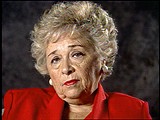
-
Beno Helmer describes conditions in the Lodz ghetto
Oral HistoryAs a young man, Beno used his foreign language skills to land small movie roles. He and his family were deported to the Lodz ghetto, where they struggled daily to find food. In the underground, Beno became an expert at derailing trains. The family was sent to Auschwitz and was separated. All but Beno and one sister, whom he found after the war, died. Beno survived a series of camps and later helped to track war criminals.
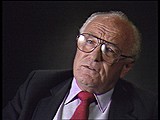
-
Leo Schneiderman describes conditions in the Lodz ghetto
Oral HistoryThe Germans invaded Poland in September 1939. Leo and his family were confined to a ghetto in Lodz. Leo was forced to work as a tailor in a uniform factory. The Lodz ghetto was liquidated in 1944, and Leo was deported to Auschwitz. He was then sent to the Gross-Rosen camp system for forced labor. As the Soviet army advanced, the prisoners were transferred to the Ebensee camp in Austria. The Ebensee camp was liberated in 1945.
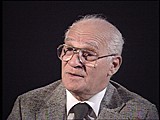
-
Leah Hammerstein Silverstein describes the aftermath of the Holocaust and the search for survivors
Oral HistoryLeah grew up in Praga, a suburb of Warsaw, Poland. She was active in the Ha-Shomer ha-Tsa'ir Zionist youth movement. Germany invaded Poland in September 1939. Jews were forced to live in the Warsaw ghetto, which the Germans sealed off in November 1940. In the ghetto, Leah lived with a group of Ha-Shomer ha-Tsa'ir members. In September 1941, she and other members of the youth group escaped from the ghetto to a Ha-Shomer ha-Tsa'ir farm in Zarki, near Czestochowa, Poland. In May 1942, Leah became a courier…
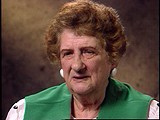
-
Leah Hammerstein Silverstein describes the emotions she felt upon arrival in Tel Aviv and Jerusalem after the war
Oral HistoryLeah grew up in Praga, a suburb of Warsaw, Poland. She was active in the Ha-Shomer ha-Tsa'ir Zionist youth movement. Germany invaded Poland in September 1939. Jews were forced to live in the Warsaw ghetto, which the Germans sealed off in November 1940. In the ghetto, Leah lived with a group of Ha-Shomer ha-Tsa'ir members. In September 1941, she and other members of the youth group escaped from the ghetto to a Ha-Shomer ha-Tsa'ir farm in Zarki, near Czestochowa, Poland. In May 1942, Leah became a courier…
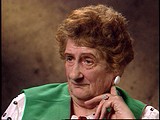
-
Ruth Webber describes the bitterness that she felt after the end of the war when she was in an orphanage in Krakow
Oral HistoryRuth was four years old when the Germans invaded Poland and occupied Ostrowiec. Her family was forced into a ghetto. Germans took over her father's photography business, although he was allowed to continue working outside the ghetto. Before the ghetto was liquidated, Ruth's parents sent her sister into hiding, and managed to get work at a labor camp outside the ghetto. Ruth also went into hiding, either in nearby woods or within the camp itself. When the camp was liquidated, Ruth's parents were split up.…
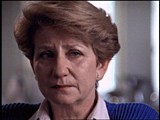
-
Thomas Buergenthal describes the difficulties involved in postwar migrations
Oral HistoryThomas's family moved to Zilina in 1938. As the Slovak Hlinka Guard increased its harassment of Jews, the family decided to leave. Thomas and his family ultimately entered Poland, but the German invasion in September 1939 prevented them from leaving for Great Britain. The family ended up in Kielce, where a ghetto was established in April 1941. When the Kielce ghetto was liquidated in August 1942, Thomas and his family avoided the deportations to Treblinka that occurred in the same month. They were sent…
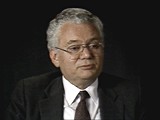
-
Rene Slotkin describes experiencing antisemitism in school in postwar Kosice
Oral HistoryRene and his twin sister Irene were born Rene and Renate Guttman. The family moved to Prague shortly after the twins' birth, where they were living when the Germans occupied Bohemia and Moravia in March 1939. A few months later, uniformed Germans arrested their father. Decades later, Rene and Irene learned that he was killed in the Auschwitz camp in December 1941. Rene, Irene, and their thier mother were deported to the Theresienstadt ghetto, and later to Auschwitz. There, the twins were separated and…
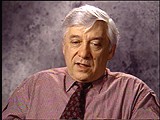
-
Irene Hizme describes life in a Catholic orphanage in postwar France
Oral HistoryIrene and her twin brother Rene were born Renate and Rene Guttmann. The family moved to Prague shortly after the twins' birth, where they were living when the Germans occupied Bohemia and Moravia in March 1939. A few months later, uniformed Germans arrested their father. Decades later, Irene and Rene learned that he was killed at the Auschwitz camp in December 1941. Irene, Rene, and their mother were deported to the Theresienstadt ghetto, and later to the Auschwitz camp. At Auschwitz, the twins were…

